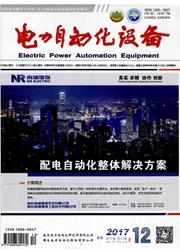

 中文摘要:
中文摘要:
智能配电网的操作运行,如智能配电网中分布式电源的分期接入等,可能导致电网节点导纳矩阵的特征值发生变化,使电网谐波谐振模式发生变化,谐振频率发生偏移,采用模态分析法及常规的抑制措施难以有效应对。针对这一问题,提出了一种无源滤波器优化策略。以目标模式模态阻抗幅值最小化为优化目标建立优化模型,并利用改进模拟植物生长算法(PGSA)对优化模型进行求解。利用IEEE 14节点标准系统构造测试算例,对所提方法进行验证并与传统方法进行对比,结果表明了所提方法的有效性和优越性。
 英文摘要:
英文摘要:
The operations of smart distribution grid,such as the staged grid-connection of DGs(Distributed Generators),may change the eigenvalues of grid node admittance matrix,resulting in the harmonic resonance mode change and the harmonic resonance frequency shift,which could not be effectively dealt with by the modal analysis method or traditional suppression measures. A strategy of passive filter optimization is proposed,which builds an optimization model with the minimum modal impedance amplitude of target mode as its objective and applies the improved PGSA(Plant Growth Simulation Algorithm) to solve it. With the standard IEEE 14-bus system as a test example,the proposed method is verified and compared with the traditional method ,showing its effectiveness and superiority.
 同期刊论文项目
同期刊论文项目
 同项目期刊论文
同项目期刊论文
 期刊信息
期刊信息
